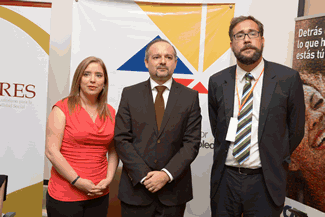
Ecuador: Challenges and opportunities to improving productivity
The First International Summit on Strategies to Change Production Infrastructure welcomes public- and private-sector experts to share their experiences.
(Ecuador, Jan.14, 2014)- CAF-development bank of Latin America-together with Ecuador's Coordinating Ministry of Production, Employment and Competitiveness and the Ecuadorian Consortium for Social Responsibility (CERES) hosted the First International Summit on Strategies to Change Production Infrastructure in Guayaquil to analyze methods in Ecuador and in the region needed to implement sustainable strategies to improve production chains and infrastructure.
Constanza Calderon, deputy director for CAF in Ecuador, opened the event with a speech outlining the financial institution's support for issues such as institutional strengthening, trade support, paperwork reduction, support for dynamic entrepreneurship and innovation, all viewed as engines to develop and grow new productivity bases and broader growth and development.
CAF's director for public policy and competitiveness, Michael Penfold, addressed overhauling and upgrading productive infrastructure at the event. During his presentation, he stressed that the region faces the challenge of increasing per-capita income, which is not possible without increasing productivity.
According to Penfold, Ecuador finds itself in the perfect position to begin addressing the primary challenges of productive change in many ways, including private-public dialogue, bringing about a more inclusive approach to value chains, linking businesses, developing production clusters, creating innovative products and increasing the availability of productivity training, among others.
"The challenge lies in moving forward with a microeconomic framework that will allow for more efficiency in economic management, thereby promoting improvements to productivity that lead to greater diversification," said Penfold.
The event featured the participation of Gabriela Rosero Moncayo from Ecuador's International Cooperation Technical Secretariat (SETECI), who addressed the issue from an international cooperation point of view. International themes were also addressed by Ronald Muench, Counselor of the Embassy of Germany in Quito, and by Rolando Jer-Ming Chaung, a government representative from the Republic of China (Taiwan).
Finally, Rebeca Vidal, CAF's executive for competitiveness, along with Esteban Ugalde, Zone Six Manager of Ecuador's Coordinating Ministry of Production, Employment and Competitiveness, addressed the achievements of a Local Productive Agglomerates pilot program, which aims to promote business development in the city of Cuenca and in the Azuay region by strengthening local productive infrastructure in the furniture and appliances sectors, which benefits the country's national economy.
CAF's more recent content

CAF, ECLAC, IDB and PAHO Promote Sustainable Development in the G20
The Regional Organizations of the Americas congratulate Brazil on its successful G20 Presidency, highlighting its leadership on key issues such as poverty, governance, and climate change. They also reaffirm their commitment to actions that promote equity and development in the region.
Urgent Call for Action to Safeguard Caribbean SIDS at CAF Symposium
As the global community grapples with the escalating climate crisis, Caribbean Small Island Developing States (SIDS) are running out of time to secure critical investments and support needed to strengthen their economies and protect vulnerable communities from the intensifying impacts of climate change. With the window to take decisive action rapidly shrinking, CAF - Development Bank of Latin America and the Caribbean, in partnership with the Commonwealth Secretariat and the Antigua and Barbuda High Commission, brought together key stakeholders for a symposium in London to address the critical vulnerabilities Caribbean SIDS face.